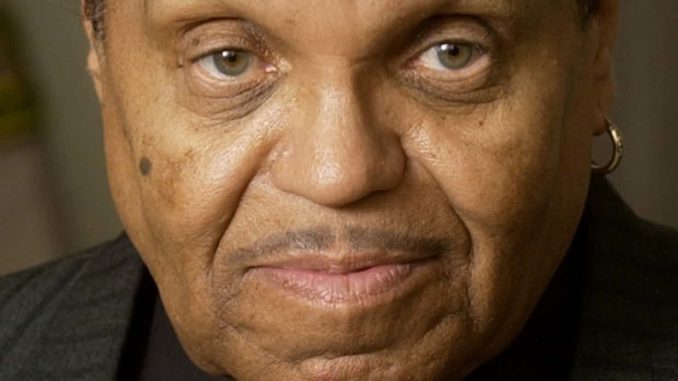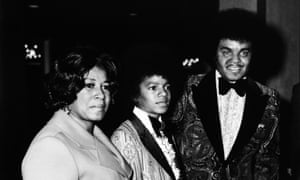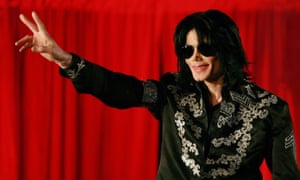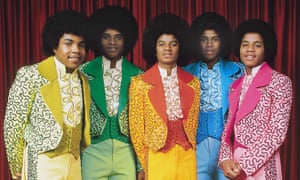
t the risk of damning a dead man with faint praise, perhaps the best thing you can say about Joe Jackson is that he may not unequivocally be the most tyrannical and monstrous father in pop history. There are other contenders for the title, not least the appalling Murry Wilson, father of the Beach Boys’ Brian, Dennis and Carl, a man whose idea of disciplining his children involved yanking out his glass eye and forcing them to stare into the empty socket and who, in a final act of belittlement stemming from his insane conviction that he was the only real talent in the family, signed away the Beach Boys’ songwriting catalogue in 1969 for $700,000, costing them somewhere in the region of $100m in royalties. An early 1990s court case alleged that Brian Wilson’s signature on the sale documents had been forged.
Even against such stiff competition, Joe Jackson has a shot at the title. A former boxer and failed blues musician, his main skill appeared to be devising innovative ways to make his children’s lives miserable. He constantly added new chapters to a catalogue of physical and mental abuse, that, when it finally came to light in the 1980s, seemed to provide the answer to a number of questions about his son Michael. Once you knew what Michael Jackson’s childhood and early career had been like, the issue wasn’t so much why he was apparently turning so weird but why it hadn’t happened sooner.

Even without their father’s influence, the Jacksons’ childhood would have been unusual. Their mother was a devout Jehovah’s Witness, fond of getting her kids to pore over the Watchtower’s illustrations of the imminent armageddon. She was also said to swab her children with rubbing alcohol – part of an obsession with cleanliness so extreme it turned her children into germophobes – and smear their faces with Vaseline on the grounds that it made them look “nice and shiny”. In winter, she reportedly sent them to school with hot boiled potatoes in their pockets in the belief this would ward off the cold.
But it was Joe Jackson who transformed their home life from merely unusual to nightmarish. He was a distant parent. “None of us can remember him holding us or cuddling us or telling us ‘I love you’,” Jermaine Jackson subsequently recalled. But the discovery that his offspring had musical talent turned him from merely cold and violent into a despot. He would beat them with a belt buckle or the cord of an electric kettle, or make them spend hours carrying cinder blocks from one side of their garden to the other when they incurred his wrath. The Jackson 5, as they were to become, were not allowed outside to play with other children: they rehearsed for five hours a day after school, their enthusiasm incentivised by the fact that if they got a dance step wrong their father would order them to break a branch off a tree in their garden that he then hit them with.
He seems to have reserved a particularly cruel streak of psychological bullying for Michael, the band’s youngest and most talented member. When Joe Jackson learned his teenage son was self-conscious about the size of his nose, he took to referring to him as Big Nose, an insult that haunted him into adulthood. Michael developed a nervous tic of constantly touching and covering his nose with his left hand as if sniffing it – hence producer Quincy Jones giving him the nickname Smelly. Then he began a series of surgical procedures so extreme that he was reportedly forced to wear a prosthesis to cover up the results. (A Rolling Stone story quoted witnesses to his body in an LA morgue claiming the prosthesis was missing, leaving only a hole in his face surrounded by bits of cartilage.)

Michael eventually did everything he could to distance himself from his father. After the success of Thriller, he had reunited with his brothers only under sufferance, and after unexpectedly calling time on a final 1984 Jacksons family tour, scuppering plans to bring it to Europe, he seemed to go out of his way to avoid his family. But he couldn’t escape Joe’s shadow. In his 40s, Michael was still telling reporters that the very thought of his father made him nauseous. The kindest interpretation of some of Michael Jackson’s later eccentricities is that they were a desperate attempt to recover a childhood his father had denied him.
There is a case for the defence. Many of the above accounts of Joe Jackson’s cruelty come from his son Jermaine’s memoir You Are Not Alone: Michael Through a Brother’s Eyes. It is a book so devoted to insisting there was nothing peculiar or untoward about the Jackson family that it is unintentionally hilarious and also disturbing. There are only so many times you can try to pass off as ordinary behaviour things such as owning a pet chimpanzee, giving it a wardrobe and dousing it in Poison by Christian Dior, before you venture into the realms of unwitting comedy.

Jermaine Jackson details his father’s actions and then justifies them. In his telling, Joe’s behaviour was a way to keep the brothers in line and off the streets. As he points out, life in their corner of Gary, Indiana, was no picnic. Gang violence was endemic, but the brothers didn’t have the time or the wherewithal to get involved: they were always rehearsing and they were too scared of their father. Jermaine claims his father honed their talents and instilled them with discipline and a will to succeed, both of which found their most extreme expression in the perfectionist, ambitious Michael. Without Joe, who knows if the world would ever have heard of Michael or the other Jacksons?
Perhaps Jermaine has a point. Then again, watch the footage of Michael performing Billie Jean at the Motown 25th-anniversary concert in 1983, the night he broke out the moonwalk for the first time. It seems almost insulting to the level of talent on display to suggest that it required physical and psychological abuse to bring it out. And then think of the unrelenting grimness of Michael’s declining years, and his death amid rehearsals for shows he was patently too ill to perform but into which – in Jermaine’s account at least – he had been pressured by promoters fearful of losing money: a man bullied into singing and dancing whether he wanted to or not. That seems most likely to represent Joe Jackson’s legacy.


Be the first to comment